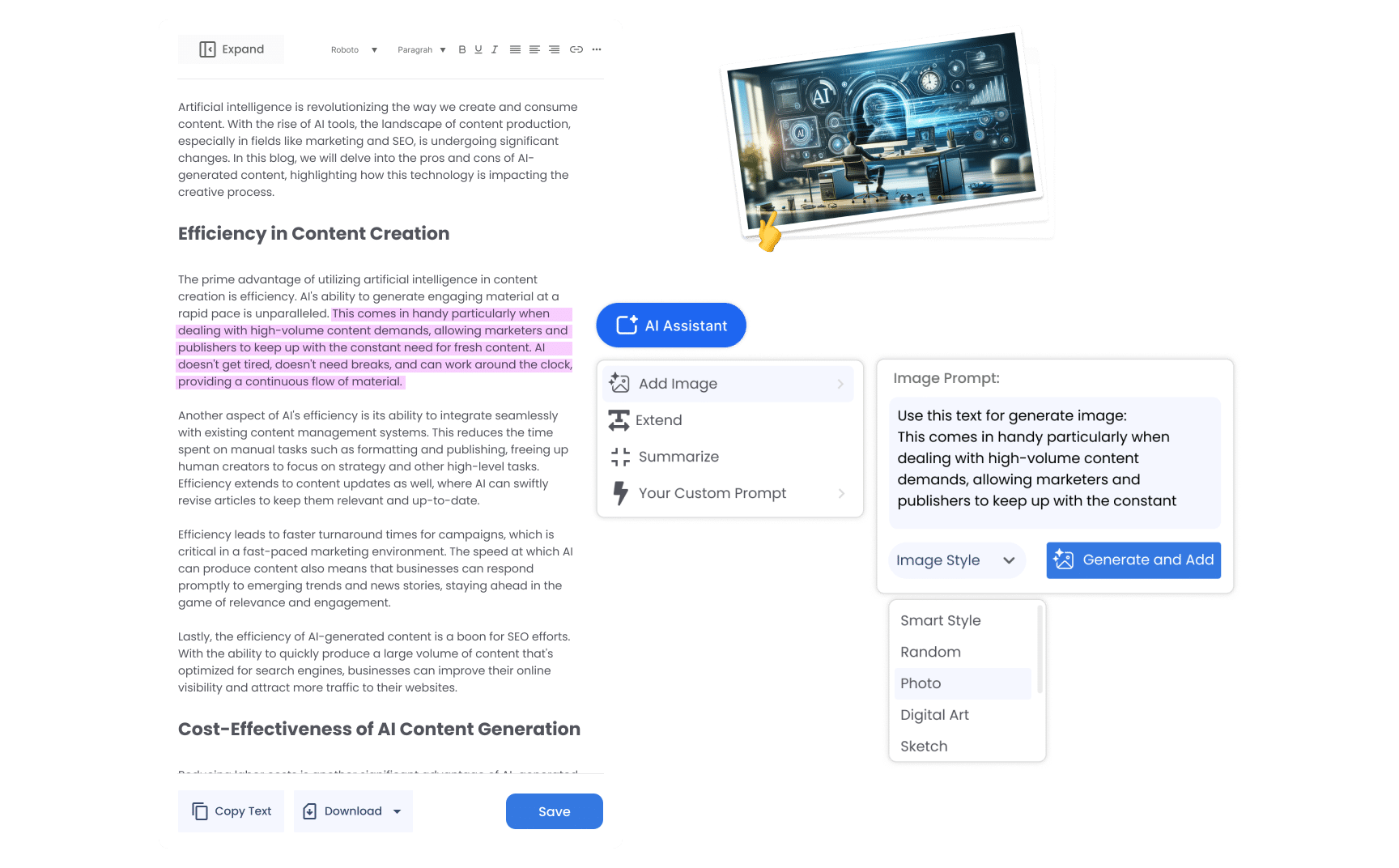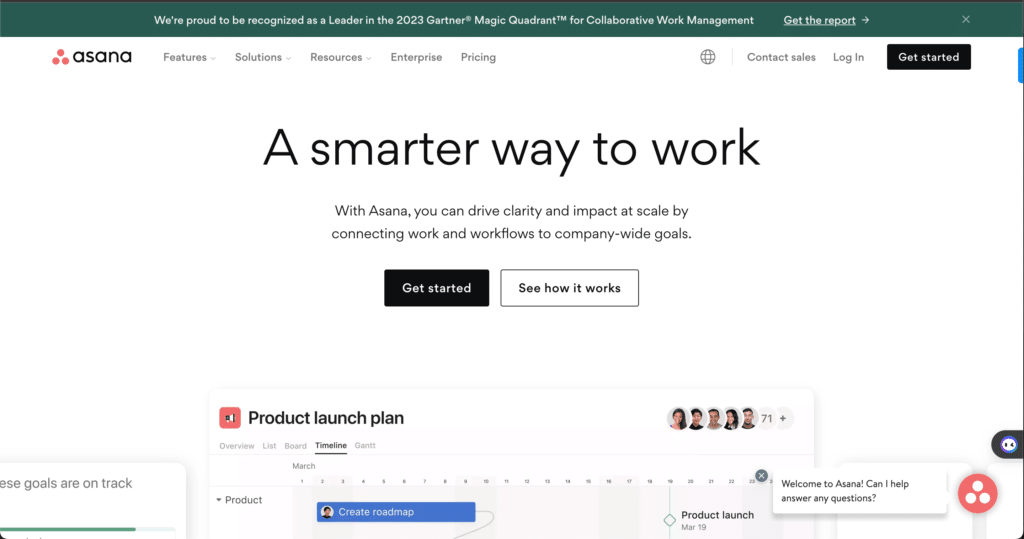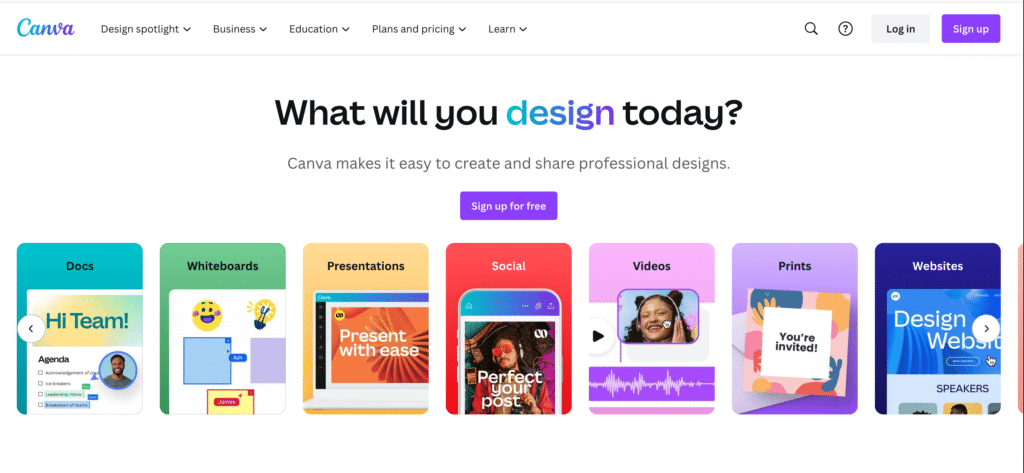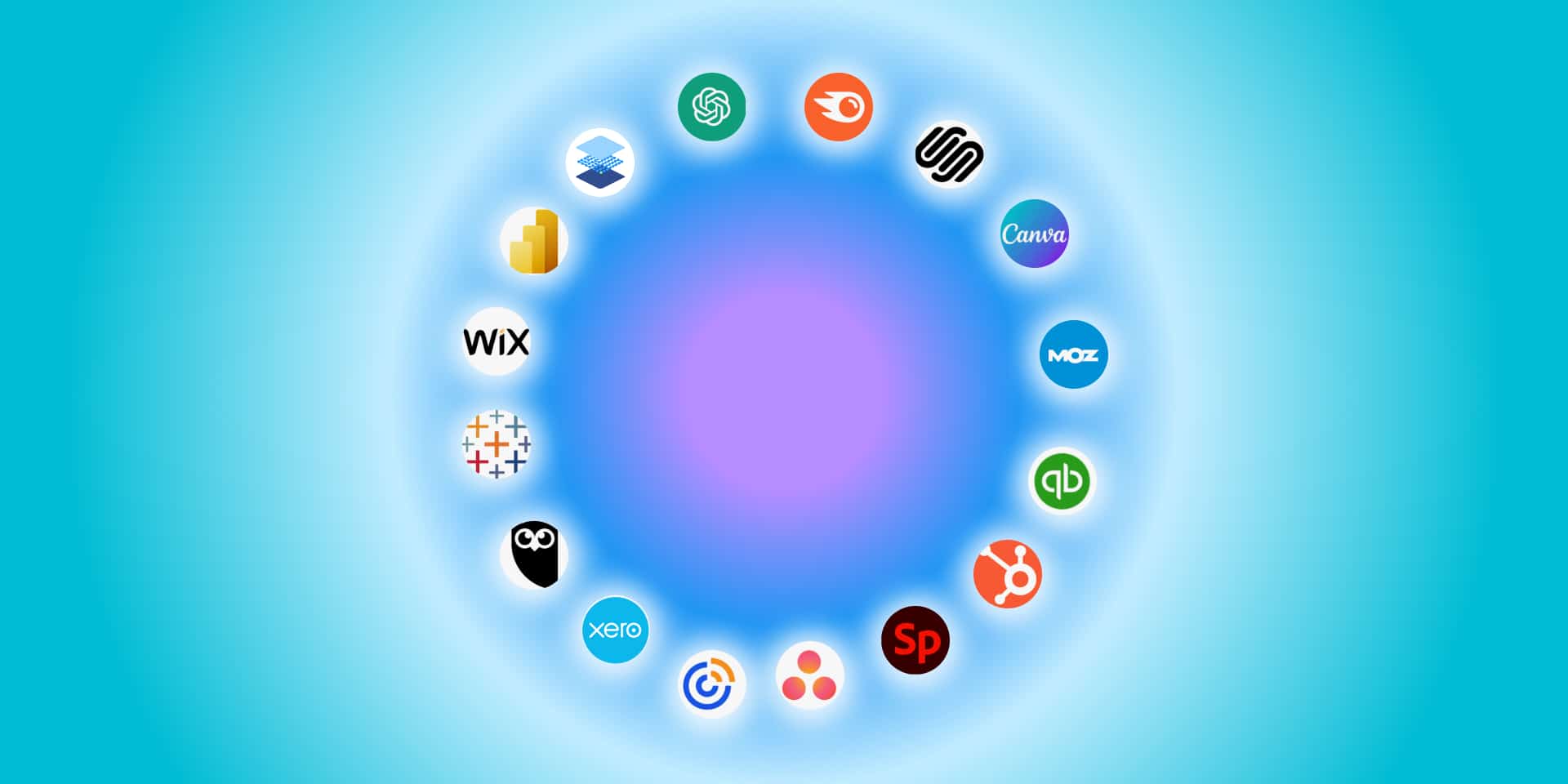Table of Contents
Consistent growth is one of the top challenges that businesses face nowadays. However, many AI tools for small businesses help automate most of the daily tasks, which leads to operational efficiency.
These tools are undoubtedly beneficial for small businesses, from sales automation and customer engagement through chatbots and SEO to AI-based content creation or bulk content generation.
Imagine you don’t need to spend endless hours and days on tasks because you can automate almost everything.
If you are helplessly looking for solutions and can’t decide, worry no more!
We’ve done research and put together the best AI tools for small businesses in this guide that won’t only help you get the job done but, at the same time, will boost your productivity, your efficiency, and your profits.
ContentGo.ai- AI Content Writing
Content is king!
You’ve heard this many times before, right?
But what is high-quality, affordable, and tailor-made content then? God?
Doing this consistently, with limited resources, can take time and effort.
ContentGo AI is a tool that basically combines every step users need during content creation.
Imagine having a reliable assistant that can generate high-quality content at a fraction of the time it would take manually.
Using natural language processing, ContentGo AI creates well-written, SEO-friendly articles, blogs, and social media posts. It simplifies content creation, prompting even for those without experience to create top-notch content. The tool also ensures that the output aligns with your brief, brand’s voice, and tone and is keyword-optimized.
As a user-friendly platform, ContentGo AI empowers business owners to become content creators without needing advanced skills.
One important thing that has to be underpinned is the ability of ContentGo AI to create SEO-friendly content.
How?
The built-in SEO Assistant helps users with keyword research and SERP analysis – the two most important aspects of content creation.
Users simply need to enter their main target keyword and choose from the list of suggested keywords.

Tip: It’s very crucial to opt-in for the keywords with low difficulty to ensure that you target your audience more efficiently.
Adapting AI for content creation is not just about the cost or time savings; it’s about leveling the playing field. Small businesses can now produce content with the quality and efficiency that was once only achievable by larger companies with more extensive resources.
Tools like ContentGo AI mark a pivotal change in marketing for small businesses, democratizing access to high-quality and targeted content creation.
ContentGo AI offers customizable templates for blogs, product descriptions, and social media platforms – like X posts. These pre-designed templates can save countless hours; you don’t need to instruct the content type each time.
Small businesses willing to create tons of content at once can benefit from the bulk content creation. This feature is very suitable for product descriptions and blog posts, as users can generate more than one piece of content simultaneously. The input tables are detailed, so you can also enter the blog or product-specific details.
Note: 10 Blog posts of 1000 words are generated in approximately 40 minutes.
But that’s not all; with ContentGo AI’s AI Assistant, you can change the generated content too! Imagine that you have some paragraphs that you want to explain in a more detailed manner or shorten. Just highlight that part of the content and easily expand or summarize the text while still fitting the context perfectly!

Additionally, you have a specific idea in mind. In that case, the AI Assistant can even add new paragraphs based on your custom prompts, ensuring your content is always fresh, relevant, and engaging to your readers.
You can include AI-generated images, too, as AI Assistant is super creative with creating the most unique ones to match your prompt.
ContentGo AI also integrates with popular platforms such as Wix, Shopify, BigCommerce, and Squarespace, so if you are on one of them, your content creation can become a game for you!
With just a few clicks, you can have your AI-crafted content live on your website or storefront, helping you to attract more customers with less effort.
To summarize, ContentGo AI:
- Helps with fast, high-quality, and tailored content creation
- Provides an SEO Assistant
- Has built-in Keyword Research and SERP Analysis tools
- Has a vast template gallery to help users with less experience
- Helps with bulk content generation
- Extends, summarizes, or generates AI images with its AI Assistant
- Integrates with platforms like Wix, Shopify, Squarespace
These features make it one of the top AI tools for small business marketing.
You can sign up for ContentGo.ai and try it for 7 days without any commitments!
Intercom or Drift – Chatbots for Customer Service
First impressions count, and that’s precisely where chatbots like Intercom and Drift come into play.
These AI-powered chatbots ensure an always-on presence, improving engagement and building trust by providing instant support and responses to customer inquiries.
Beyond answering frequently asked questions, these tools learn from interactions to offer personalized experiences. They are vital in streamlining customer service and freeing valuable time for your team to focus on more complex queries.
The key benefits of employing such tools include:
- Reduced wait times,
- Round-the-clock support,
- And a more personalized approach to customer service.
The automated yet human-like conversation capabilities these platforms offer ensure that small businesses can provide customer service that rivals their larger counterparts.
Many customers today expect immediate responses, and with Intercom or Drift, you can meet those expectations. They offer advanced features like visitor targeting and routing messages to the appropriate teams.
Engagements can start with these AI chatbots and transition seamlessly to live agents when necessary. The result is a more streamlined, efficient, and satisfying customer service experience.
Features of Intercom and Drift:
Intercom and Drift are known for their:
- ease of use,
- user-friendly interfaces,
- offer analytics to track engagement and business growth
- and continued dedication to integrating AI to improve both customer and business experiences.
Such chatbots represent a significant productivity hack for small business owners and can be categorized as the best AI tools for work.
Intercom is renowned for its versatile messaging suite that allows you to connect with customers through personalized, automated messages. Their platform’s strength lies in its robust customer support and onboarding experiences, making it an excellent choice for businesses looking to build strong relationships with prospects and customers.
On the other hand, Drift focuses on conversational marketing and sales. It uses AI-driven chatbots to simulate real-time interactions, qualify leads, and book meetings outside business hours. This immediate engagement can benefit small businesses aiming to capture every opportunity in a competitive market.
Assessing the specific features and potential return on investment will help small businesses make an informed choice for their AI-powered marketing stack.
You may be concerned about the pricing of these products.
Currently, Intercom prices start from $39. Drift may be expensive for small businesses, but with their exquisite features, you may consider them too!
Mailchimp or Constant Contact – Email Marketing Automation
Email marketing remains one of the most effective digital marketing strategies, but it can be time-consuming and complex without the right tools.
Tools like Mailchimp and Constant Contact leverage AI to demystify email marketing, providing fully automated personalized campaigns to your audience. These tools help small businesses create meaningful connections with their customers by delivering the right message at the right time.
Comparing Mailchimp and Constant Contact is essential for businesses to decide which tool aligns best with their marketing goals.
Let’s evaluate their advantages and disadvantages, including pricing considerations:

Mailchimp:
- Advantages: Offers a user-friendly interface and a free tier suitable for startups. It has robust automated features and comprehensive analytics for campaign optimization. The platform also integrates well with numerous third-party applications.
- Disadvantages: As businesses grow, they may find Mailchimp’s pricing can become quite steep. Some users also feel that the platform becomes more complex with scale, potentially requiring more time investment to manage campaigns effectively.
- Pricing: Mailchimp provides a free plan for basic needs, with paid plans starting at $9.99/month, scaling up in cost based on the number of contacts and the required features.
As email marketing is crucial for small businesses, Mailchimp offers a free plan – that pretty much answers many needs – and is one of the best free AI tools for small businesses.
Constant Contact:
- Advantages: Known for excellent customer support and easy-to-use email templates. Constant Contact also offers strong social media integration, a boon for omnichannel marketing efforts.
- Disadvantages: Compared to Mailchimp, it has fewer features in its lower-tier plans and lacks a free option. It also has fewer automation and customization options, limiting campaign versatility.
- Pricing: Unlike Mailchimp, Constant Contact doesn’t offer a free plan, with pricing starting at $20/month for up to 500 subscribers and increases based on the number of subscribers and additional features.
Mailchimp and Constant Contact offer robust platforms to enhance your email marketing campaigns.
Your choice may boil down to budget constraints, ease of use, level of customer service needed, and specific marketing goals.
Whether your goal is to nurture leads, promote a new product, or keep your audience engaged, AI-powered email marketing automation tools are invaluable assets. They save time, offer profound insights, and enhance engagement, all critical components for the success of your email campaigns.
Choosing between Mailchimp and Constant Contact depends on personal preference and specific business needs. Still, both are leaders in the space and highly capable of transforming your email marketing efforts.
HubSpot CRM – CRM Systems with AI Integration
Customer Relationship Management (CRM) is at the heart of any successful marketing strategy, and AI integration has revolutionized this domain.
HubSpot CRM stands out as the frontrunner, offering robust AI functionalities for small businesses.
These platforms provide a wealth of information about contacts, helping businesses personalize their interactions and anticipate customer needs.
Tasks that traditionally consumed much time, such as data entry and lead qualification, are now automated through these AI-infused CRM systems.
Beyond lead management, both Salesforce and HubSpot CRM facilitate enhanced analytics and reporting. Small businesses can now understand their sales funnels and marketing campaigns with high precision, using AI to identify trends, patterns, and potential areas of improvement.
Communication is another pillar improved by AI in CRM tools. These systems help manage and automate communication, scheduling follow-ups and ensuring every lead is remembered.
Choosing the right AI marketing tool is crucial for small businesses looking to improve their customer relationships and sales processes. HubSpot CRM is a prominent platform offering powerful features to help with these objectives.
However, after using the tool for a long time, I would like to list some advantages and disadvantages that might help you during decision-making.
HubSpot CRM
Advantages:
– User-Friendly Interface: Known for ease of use, making it ideal for small businesses without a dedicated sales force.
– Free Tier Available: Offers essential CRM features at no cost, suitable for businesses starting CRM practices.
– Good for Small Businesses: Particularly advantageous for smaller businesses or startups.
These advantages bring HubSpot to the top of the list of AI tools for small businesses.
Disadvantages:
– Limited Advanced Features in Free Tier: Upgrading to paid plans for more advanced features can be costly.
– Less Customization Depth: You may need more depth of customization available in Salesforce.
For a small business choosing between Salesforce and HubSpot CRM, the decision often comes down to current needs and future goals.
If your business values ease of use and minimal set-up and wants a cost-effective solution, HubSpot CRM’s free tier is the solution.
QuickBooks or Xero – Accounting Software with AI
Financial management is a cornerstone for any small business, and AI has even made its mark in accounting software.
QuickBooks and Xero are at the forefront of this evolution, providing intuitive platforms that use AI to streamline accounting tasks.
Automated data entry, expense tracking, and invoice management are just the tip of the iceberg regarding their capabilities.
Integrating AI in accounting software like QuickBooks and Xero drastically reduces the possibility of human error.
It offers predictive budgeting and forecasting, giving small business owners a clear view of their financial health. With the ability to recognize patterns in cash flow, these tools anticipate future financial scenarios, enabling more informed decision-making.
One of the most significant advantages of using AI-powered accounting software is the time saved on repetitive tasks.
QuickBooks and Xero handle everyday accounting tasks and provide valuable insights through their reporting features.
You can generate detailed financial reports with just a few clicks, understanding your revenue streams and expenses. These AI-generated insights can inform better strategic planning and resource allocation.
For small businesses worried about compliance, these AI accounting tools stay up-to-date with the latest tax laws and regulations. They ensure that your financial reporting adheres to the relevant standards, reducing the risk of penalties or fines. Security is also a top priority, with advanced encryption and data protection measures in place to safeguard sensitive financial information.
Both platforms leverage AI to provide a seamless accounting experience, supporting small business owners in managing their finances with precision and ease. No longer a mere trend, AI in accounting software has become a necessity for those seeking to maintain a competitive edge.
Neither QuickBooks nor Xero offers a free plan, but the options are suitable for any budget.
So, choosing one often depends on personal preference and specific business needs.
Hootsuite or Buffer – Social Media Management Tools
Social media is a vital channel for small businesses wanting to engage with their audience, increase their visibility, and drive website traffic.
Managing multiple social media accounts can be overwhelming, but thanks to Hootsuite and Buffer, AI simplifies the process. These tools offer a centralized platform for scheduling posts, monitoring interactions, and analyzing performance.
AI enhances the social media management experience by recommending optimal posting times based on user engagement patterns. Both Hootsuite and Buffer analyze your audience’s online activity, helping you publish content when it’s most likely to be seen and engaged with.
This strategic timing can make a significant difference in the reach and impact of your social media campaigns.
Content curation is another area where AI-powered tools shine. By learning your preferences and examining trending topics, Hootsuite and Buffer suggest relevant content your audience might find interesting.
This feature keeps your social media feeds fresh and engaging without the need to constantly search for new content ideas manually.
Monitoring your brand’s social media presence is crucial, and AI makes it more robust. With sentiment analysis and keyword tracking, you can understand how your brand is perceived and respond quickly to negative comments or mentions. This proactive management helps maintain a positive online reputation for your small business.
Finally, both Hootsuite and Buffer offer straightforward user interfaces and integrations with a wide array of social media platforms, making them accessible to small businesses of all types.
Whether your focus is Facebook, X, Instagram, LinkedIn, or any combination thereof, these tools streamline your social media management in a way that was once reserved for enterprise-level companies.
I’ve used Hootsuite for a long time and managed 3 social media accounts. It provides a user-friendly interface that makes social media management super easy.
On the other hand, Buffer has free plans for individuals and new starters, so if you are tight on budget, Buffer is a better choice!
But both are great choices and make it to all the lists when it comes to social media-focused AI tools for small businesses.
ChatGPT – AI-Powered Chatbot

Or should I call it an assistant?
Most of you are familiar with it, but still worth mentioning. ChatGPT is an AI-powered chatbot that can comprehend natural language inputs from users.
This makes it one of the best AI tools for businesses as it understands the natural language and creates a meaningful conversation with all its users in an authentic context. This means that ChatGPT can provide detailed answers, answer questions – complex or simple – and assist with numerous things.
I use it, too, to automate some of my daily tasks or even brainstorm new ideas whenever I feel stuck.
It provides a free version backed with GPT 3.5 and can perform many tasks that ease small business owners in many ways.
The user-friendly interface makes it highly accessible and easy to use. Plus, it supports more than 50 languages.
But of course, there are some limitations that all users should be aware of. For example, the responses can be inaccurate or repetitive. The free version might lag or crash occasionally, so for users who want to avoid dealing with this kind of stuff, ChatGPT offers the pro plan for $20/month.
It is one of the must-have AI tools for small businesses. It is more suitable for those who do not want to dive deep into many details.
SEMrush or Moz – AI-Powered SEO Tools
Regarding SEO, tools like SEMrush and Moz are must-haves as they use AI to provide in-depth analysis and actionable insights. They enable businesses to improve search engine rankings through keyword research, backlink audits, and site health checks.
Both offer competitive intelligence features, allowing for a strategic approach to outranking competitors.
SEMrush boasts an extensive database of over 20 billion keywords, making it a powerhouse for uncovering long-tail and niche market keywords.
Its features include
- Position tracking,
- SEM reporting,
- and backlink analysis.
Moz, on the other hand, provides an intuitive interface with capabilities such as
- Site audits,
- Rank tracking,
- And keyword analysis.
While SEMrush may be seen as more robust in integrations and data, Moz is often lauded for its user-friendly experience and helpful community.
However, the challenge for small businesses can be the cost. SEMrush starts at $129.95/month, and Moz at $99/month, which may be hefty for smaller budgets.
The tools’ depth may also require a learning curve, but they offer free trials or limited free versions for starters.
One common drawback for both is the reliance on constantly changing search engine algorithms, meaning vigilance is vital for sustained results. Considering the pros and cons, these tools can be critical in bolstering online visibility for small businesses.
Some users have expressed concerns with the breadth of the features, feeling overwhelmed by the options and data available. Customer support has also surfaced as an area needing improvement for these platforms. Nonetheless, AI-powered SEO can save time and resources, making it popular among marketers.
Suppose you are more on the simple solution side and want to complete many tasks with one tool. Consider ContentGo AI’s SEO Assistant, which allows you to do your keyword research and SERP before generating content.
These are all included in the plans, so users do not have to pay extra costs!
KW VE SEPR ANAlizi imaj
Asana or Trello – Project Management Tools

Efficient project management is a cornerstone for any growing business. Asana and Trello provide AI-powered solutions that streamline project coordination. They both offer a visual interface where tasks can be easily tracked and managed, enabling teams to stay organized and productive.
Asana allows for more complex project plans with custom fields, timelines, and workload management, which is ideal for managing multiple teams and large projects. It empowers businesses with automation, delegating repetitive tasks to AI, thus optimizing team workflows.
With its card-based Kanban design, Trello is a favorite for its simplicity and ease of use. Its subtle AI offers card and board recommendations based on user activity. This simplification, however, can be limiting for companies with intricate project needs.
As for pricing, both tools offer free versions with essential features. Asana’s premium plan starts at $10.99 per user/month, and Trello Gold is $5 per month, which could be considered for advanced functionality.
Cost-effectiveness is a significant attraction point for small businesses that may not require the bells and whistles of higher-tier plans.
Criticisms of Asana include its complexity, which might be intimidating for newcomers, while Trello can sometimes feel too basic for those desiring advanced project management features. Despite these, their AI integrations offer valuable opportunities for businesses to automate redundant tasks and focus on decision-making.
After using both tools in different organizations for a long time, it’s crucial to pinpoint some advantages and disadvantages and provide some information about their pricing.
- Advantages of both tools: Improved organization, time-saving through automation, and various integrations for extended functionality.
- Disadvantages of both tools: Asana may be complex for beginners, and Trello might be too simple for larger projects.
- Pricing: Asana is $10.99/user/month, and Trello Gold is $5/month. They both offer free plans.
Tableau or Microsoft Power BI – Data Analytics and BI Tools
Data-driven decisions are increasingly significant, and tools like Tableau and Microsoft Power BI use AI to bring sophisticated data analysis to businesses of all sizes. Both platforms help understandably visualize complex data, aiding in uncovering trends and insights critical for strategic planning.
Tableau stands out with its strong data visualization capabilities and user-friendly drag-and-drop interface. It also offers natural language querying, allowing users to ask questions directly to the data. Power BI integrates seamlessly with other Microsoft services and is preferred by those already relying on the Microsoft ecosystem.
Cost can affect a small business’s decision between these tools. Tableau’s pricing starts at $75 per user/month, which might be steep for small teams, while Power BI’s more affordable Pro version is $10 per user/month. This often makes Power BI an accessible entry point into BI tools.
Small businesses may find these tools’ extensive functionalities more than they need, potentially leading to underutilization. They also require data savvy to reap the full benefits, although both provide educational resources to assist new users.
- Advantages: Intuitive data visualization, integration with existing ecosystems, enhanced decision-making through insights.
- Disadvantages: It may be costly, with the potential for feature underutilization of data literacy needed for maximum benefit.
- Pricing: Tableau is $75/user/month, and Microsoft Power BI Pro is $10 /user/month.
Wix or Squarespace – AI-Powered Website Builders
A solid online presence in today’s digital marketplace is non-negotiable.
AI-powered website builders like Wix and Squarespace provide small businesses with the tools to create attractive, functional websites without coding.
They make the design process more manageable and personalized.
Wix’s ADI (Artificial Design Intelligence) creates tailored websites by asking questions to understand a business’s needs. Squarespace, renowned for sleek templates and a design-centric approach, also incorporates AI to suggest the best designs based on user inputs.
While Wix offers a free basic plan, going ad-free and accessing more advanced features requires a premium plan, which starts at $16 per month. Squarespace packages start slightly higher at $16 per month, billed annually.
These costs are relatively affordable for most small businesses seeking a professional web presence.
Some users of Wix have highlighted the platform can become laggy with more complex sites, while Squarespace users sometimes note limitations in customization options. Despite this, their AI elements significantly lower the barrier to creating visually appealing and functional websites.
- Advantages: User-friendly interfaces, no coding skills required, AI-enhanced customization.
- Disadvantages: Wix’s performance with complex sites Squarespace customization limitations.
- Pricing: Wix is from $16/month, Squarespace is from $16/month (billed annually).
Canva or Adobe Spark – AI Tools for Content Design

Content creation can be both time-consuming and challenging for small businesses. Canva and Adobe Spark provide AI-enhanced design tools that facilitate the creation of marketing materials, social media graphics, and more.
Both platforms use AI to suggest designs, layouts, and color themes that best fit a brand’s aesthetic.
Canva, with its extensive template library and user-friendly interface, is favored by non-designers for quickly creating professional-looking visuals. Adobe Spark targets users with more design experience but simplifies the process with AI-curated graphic suggestions.
Both platforms are accessible with free limited versions. Canvas Pro account starts at $119.99 annually, while Adobe Spark’s plan is at $9.99 per month. For the wealth of resources and time-saving features they provide, many small businesses consider these tools a worthy investment.
Yet, while they are powerful, they cannot fully replace the expertise of a professional designer. And for those with specialized or complex design needs, the platforms occasionally fall short.
Nonetheless, they are invaluable assets for rapid and accessible content creation.
- Advantages: Simplifies design for non-experts, vast template options, AI-driven design customization.
- Disadvantages: May not replace professional design services, possible limitations for complex projects.
- Pricing: Canva Pro from $119.99/year, Adobe Spark at $9.99/month. They both offer free plans.
I’ve been using Canva for a long time, and updating to Pro was one of my best decisions ever. Removing backgrounds, adding your color pallet, endless templates, and picture styles that come with the Pro package speed up the design process.
And obviously, these features make Canve one of the top AI tools for small businesses.
Deciding on the Best AI Tools for Small Businesses Can Lead to Consistent Growth
Deciding on the best AI tools for small businesses comes from understanding each firm’s needs, financial constraints, and long-term goals. A tool’s advantages make it an excellent fit for one company, while its disadvantages could be a deal-breaker for another.
The common thread is the desire for small businesses to maximize efficiency, streamline operations, and enhance decision-making, all of which AI tools can facilitate.
Remember that technology is a means to an end, and the accurate measure of an AI tool’s worth is how well it helps you achieve your business objectives.
Consider the above insights as a starting point to navigate the vast ocean of AI marketing tools for small businesses and choose the ones that will propel your small business forward.
